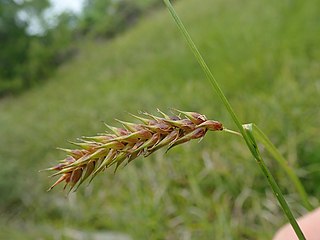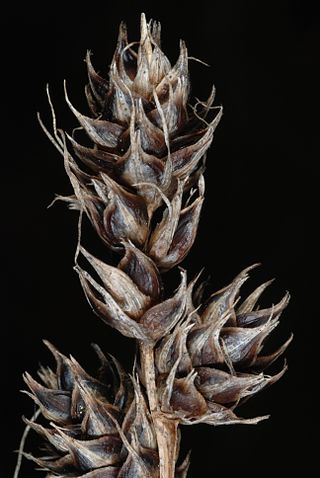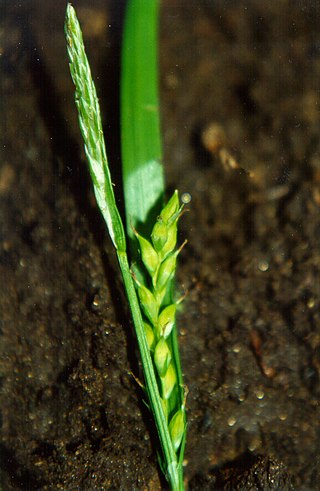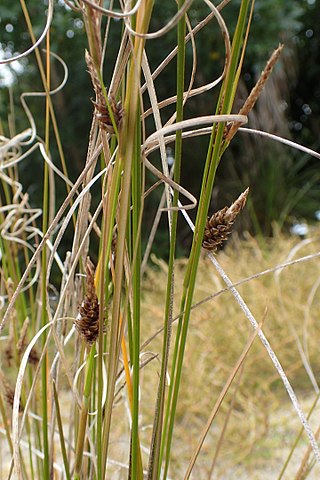
Carex bebbii, Bebb's sedge, is a species of sedge native to the northern United States and Canada. Carex bebbii grows in a variety of wetland habitats such as lakeshores, streambanks, ditches, meadows, swamps, and seeps. It forms dense tufts with culms up to 90 centimeters tall.

Carex communis, the fibrous-root sedge, is a species of flowering plant in the genus Carex, native to central and eastern Canada and the central and eastern United States. Its seeds are dispersed by ants.

Carex laxiculmis, the creeping sedge, is a species of flowering plant in the family Cyperaceae, native to Ontario, Canada, and the central and eastern United States. As with most species of sedge, it prefers to grow in shady, wet areas. Its cultivar 'Hobb', sold under the trade designation Bunny Blue, is available from commercial nurseries.

Carex atlantica, the prickly bog sedge, is a species of flowering plant in the family Cyperaceae, native to eastern North America, and eastern Hispaniola. It is usually found growing in bogs or acidic seeps.

Carex exsiccata, the western inflated sedge or beaked sedge, is a species of flowering plant in the family Cyperaceae, native to British Columbia, Washington state, Oregon, Idaho, Montana, Colorado, and California. Native peoples used its roots to make a black dye.
Carex arkansana is a tussock-forming species of perennial sedge in the family Cyperaceae. It is native to central parts of the United States.
Carex austrocaroliniana is a tussock-forming species of perennial sedge in the family Cyperaceae. It is native to south eastern parts of the United States.
Carex californica is a tussock-forming species of perennial sedge in the family Cyperaceae. It is native to western parts of the United States.

Carex congdonii is a tussock-forming species of perennial sedge in the family Cyperaceae. It is native to parts of California.

Carex donnell-smithii is a tussock-forming species of perennial sedge in the family Cyperaceae. It is native to parts of Mexico and Central America.
Carex engelmannii is a tussock-forming species of perennial sedge in the family Cyperaceae. It is native to western parts of North America.

Carex gravida, also known as heavy-fruited sedge, heavy sedge or long-awned bracted sedge, is a tussock-forming species of perennial sedge in the family Cyperaceae. It is native to southern parts of Canada and parts of the United States.

Carex hendersonii, also known as Henderson's sedge or carex de Henderson, is a tussock-forming species of perennial sedge in the family Cyperaceae. It is native to western parts of North America.
Carex idahoa is a tussock-forming species of perennial sedge in the family Cyperaceae. It is native to western parts of North America.
Carex kulingana is a tussock-forming species of perennial sedge in the family Cyperaceae. It is native to south eastern parts of China.

Carex litorosa, commonly known as sea sedge, is a tussock-forming species of perennial sedge in the family Cyperaceae. It is native to New Zealand.
Carex madrensis is a tussock-forming species of perennial sedge in the family Cyperaceae. It is native to parts of Mexico.
Carex nova is a tussock-forming species of perennial sedge in the family Cyperaceae. It is native to western central parts of the United States.
Carex pringlei is a tussock-forming species of perennial sedge in the family Cyperaceae. It is native to north eastern parts of Mexico.









